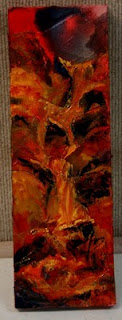More and more you read these words in prospectus and show outlines. That along with the wording “nothing based on published photographs or under the direction of class or workshop” All works must be original. Still. Many show personal complain that they still get work based on photos published in books and on the web. So obviously, many people do not know just what is meant by derivative work.
A derivative work is defined as one that is substantially derived from another underlying work. The dictionary also notes that such a work, when based on a copyrighted work is an infringement if permission is not obtained prior to execution. Understand? No. Well if you can tell where it came from, it is a derivative work.
This used to be quite common in artwork. All over the world you could find these works and art historians could trace their origins. With the establishment of copyright, and intellectual property, it is now a definite no-no.
A derivative work is defined as one that is substantially derived from another underlying work. The dictionary also notes that such a work, when based on a copyrighted work is an infringement if permission is not obtained prior to execution. Understand? No. Well if you can tell where it came from, it is a derivative work.
This used to be quite common in artwork. All over the world you could find these works and art historians could trace their origins. With the establishment of copyright, and intellectual property, it is now a definite no-no.
Fair Use
Well, what about fair use, you ask. It truth, fair use has nothing to do with creating new works of art, which collage artists around the world repeatedly fine out. This clause in the copyright laws is actually meant for critique and publicity. Reporters and critics covering art shows and doing book reviews, etc, can show snapshots of or include excerpts from works and shows they are reviewing. It was never meant to say you could take parts of other works and incorporated them into your own work. Most shows do include a clause in their prospectus explaining that images can be used to publicize that show or gallery. This is also fair, and does not effect the actual copyright holder’s integrity.

When is reference not reference?
But I only used that photo for reference in my painting, isn’t that fair? Well is it? Why did you use that photo? Did you copy the layout of it? Mimic the colors and lighting? Use the same stances of the people?
Dictionary.com defines reference, number 8 as: “use or recourse for information”. This is the meaning that our reference photos should have.
I am doing a painting with a horse, oh; I need a picture of a horse so I know how many legs a horse has. You should use those photos for information only, the actually composition of your painting must be your own if the painting is to be submitted to any show or competition.
If you copy the composition of a photo, you are copying the photographer/artists work, their artistic vision. There is a huge temptation to do this. We all have calendars, books etc, that contain photos we would love to copy. But remember, this makes it a derivative work.
When is a derivative work not a derivative work?

Well, all I have to do is change 10% of it and it is my own. Or simply reverse it. Where this myth came from I don’t know. But it persists. Not true, people. Simply change a few things around, reversing the photo, etc. does not mean it is ok to copy. How do you know the photographer did not reverse the print before it was published? And there is no truth to the 10% rule at all. If you can recognize where it came from, it is copying. And don’t think simply doing it in another medium makes it ok. It does not.
Now there is definitely a difference between derive from and inspired from. One is totally based on the previous work, the other has it own composition, style, texture, etc.
Royalty Free photos on the web
There are tons of sites on the web to view and download photos. Read the fine print. Even on the stock photo sites, these works cannot be copied for artwork. The fine print even states that you cannot use these for derivative works. If you find a photo you like, you must get permission in writing from the photographer to use it. The site you find it on may or may not be the site of the photographer, and I would be cautious of any site that does not protect or mark the photos. Many websites unfortunately, make free with photos, drawing and paintings found on the Internet. Yes, Virginia, things on the internet are covered by copyright laws.
As artists we want to showcase our own creativity.
I would love to hear your take on this, or your questions.
ReplyDeleteI did enjoy this Susan:)! I hear artists say all the time ..'if I just change it enough I don't need permission'...it is wrong to do this! To me it's like someone liking a 4'x4' section of my painting..making a copy of that section and recreating it within their artwork..I would definitely not like it ..even if 90% of the work is theirs...
ReplyDeleteAnd it is illegal! And I would not like it either!
ReplyDeleteThat is a real problem we have at the Renaissance Gallery for our open entry shows. Making sure the people submitting work have not copied. So many don't understand this!
It is so hard to convince artists that original and non-derivative works are FAR more pleasurable to do - as well as being completely fear-free...There's no better thing than learning through referencing and re-arranging elements, but if you ALWAYS consider them 'studies' and for your own experience only you will become an artist without fences much more quickly.
ReplyDeleteI think a lot of it is lack of training. Too often even in school they are encouraged to copy. "Now do it this way kids"
ReplyDeleteAnd you are right, "studies" are a great way to learn! I did tons myself, but I do not show this work, It was a learning experience only!
I am a better artists for it, but if and when I use a photo reference, it is my own!
Like the photo above and the painting I did of it!
I get the impression some people don't read the entry rules/requirements at all, they take in what the overall subject or medium is, and stop there, wasting their entry fee and the organizer's time.
ReplyDeleteThey simply don't get it. They understand the part about their work being theirs but they still do not get the fact that you cannot copy some other artists work. That a photographer has as much right to his or her work as a painter.
ReplyDeleteHow often do we read the words "I found this photo on the internet" ? Like these photos simply appear out of the ether, and no one is behind it.
When you do have to reject a work for this, they get really mad at you. The take it personally, as an assault on their character. They do not realize that they have stolen anothers work.
I have student all the time bring in such photos or I am asked, "you are an artist, can do make me a copy of so-and-sos painting? And they are upset when I say no.
I hear one woman say, not so behind my back, "well she can't do it so she uses that as an excuse, she is not real artist!"
Ah!!!!!!!!!!